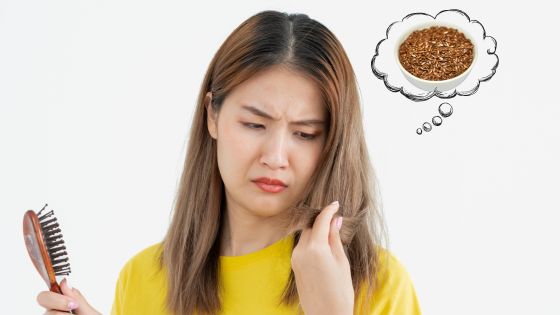Flaxseed Benefits for Hair: Unlock Nature's Secret to Lustrous Locks

Hey there, fabulous hair aficionados! Have you ever wondered if a tiny seed like flaxseed can make a huge difference in your hair game?
Enter flaxseed—the golden ticket to healthier, shinier, and stronger hair. Let's embark on this fun-filled journey to discover how flaxseed can transform your tresses!
What Is Flaxseed?
Flaxseed, or linseed, comes from the flax plant (Linum usitatissimum). This tiny, nutty-flavored seed has been cherished for centuries, not just for its health benefits but also for its magical impact on hair.
Nutritional Powerhouse: What's Inside Flaxseed?
Flaxseeds are packed with nutrients that are a boon for your hair:
- Omega-3 Fatty Acids: Alpha-linolenic acid (ALA) nourishes hair follicles.
- Vitamin E: A powerful antioxidant that promotes scalp health.
- B Vitamins: Essential for hair growth and strength.
- Protein: Building blocks for hair structure.
- Lignans: Antioxidants that help in hair growth.
How Flaxseed Benefits Your Hair
1. Promotes Hair Growth
The omega-3 fatty acids in flaxseed:
- Nourish the hair follicles.
- Improve blood circulation in the scalp.
- Help reduce hair thinning and shedding.
2. Adds Shine and Lustre
Vitamin E in flaxseed:
- Repairs hair damage.
- Protects hair from free radical stress.
- It leaves your hair silky and shiny.
3. Prevents Dandruff and Dry Scalp
Flaxseed's anti-inflammatory properties:
- Soothe an itchy scalp.
- Moisturize dry scalp conditions.
- Reduce flakiness and dandruff.
4. Strengthens Hair Strands
The high protein content:
- Enhances hair elasticity.
- Reduces breakage and split ends.
- It makes hair more resilient to styling damage.
How to Use Flaxseed for Fabulous Hair
Flaxseed Oil Massage
- What to Do: Warm some flaxseed oil and gently massage it into your scalp.
- Benefits: Improves blood circulation, promotes hair growth, and moisturizes the scalp.
DIY Flaxseed Hair Gel
- What to Do: Boil flaxseeds in water, strain, and cool to create a natural hair gel.
- Benefits: Provides hold for styling while nourishing your hair.
Flaxseed Smoothies
- What to Do: Add ground flaxseed to your morning smoothie.
- Benefits: Nourishes your hair from the inside out with essential nutrients.
Flaxseed Hair Mask
- What to Do: Mix flaxseed oil with honey and yogurt, apply to hair, leave for 30 minutes, and rinse.
- Benefits: Deep conditions, adds shine, and strengthens hair.
Tips and Precautions
- Patch Test First: Always do a patch test to rule out allergies.
- Moderation is Key: Excessive use might lead to oily hair or scalp irritation.
- Quality Matters: Opt for organic, cold-pressed flaxseed oil for maximum benefits.
- Storage: Keep flaxseed and its oil refrigerated to prevent rancidity.
Time to Embrace Flaxseed Magic!
Why not give flaxseed a whirl and let your hair reap the benefits of this tiny wonder seed? Whether you eat it or apply it, flaxseed is a fun and easy addition to your hair care routine that'll have you flipping those luscious locks in no time!
Frequently Asked Questions (FAQ)
1. Can flaxseed really promote hair growth?
Yes, flaxseed is rich in omega-3 fatty acids and vitamin E, which nourish hair follicles and can promote healthier hair growth. While it may not work miracles, incorporating flaxseed into your diet and hair care routine can support hair health.
2. How do I make flaxseed hair gel at home?
To make flaxseed hair gel:
- Ingredients: 1/4 cup of whole flaxseeds and 2 cups of water.
- Instructions:
- Boil the water and add flaxseeds.
- Simmer and stir until it reaches a gel-like consistency.
- Strain the gel using a fine mesh strainer while it's hot.
- Allow it to cool before use.
This natural gel provides hold and nourishment without harsh chemicals.
3. Can I use flaxseed oil on my hair daily?
While flaxseed oil is beneficial, using it daily might make your hair greasy. It's best to apply it 1-2 times a week as a deep conditioning treatment or add a small amount to your shampoo or conditioner.
4. Is flaxseed safe for all hair types?
Absolutely! Flaxseed can benefit all hair types, whether curly, straight, oily, or dry. Just adjust the amount and frequency based on how your hair responds.
5. Can consuming flaxseed cause any side effects?
Flaxseed is generally safe to eat. However:
- Digestive Issues: Overconsumption may lead to bloating or gas.
- Allergic Reactions: Rare but possible. If you experience any adverse effects, discontinue use and consult a healthcare professional.
6. Does flaxseed help with dandruff?
Yes, flaxseed's anti-inflammatory properties can help soothe an itchy scalp and reduce dandruff. Applying flaxseed oil or gel can moisturize the scalp and alleviate dryness.
7. Where can I buy flaxseed and flaxseed oil?
You can find flaxseed and flaxseed oil at:
- Health food stores
- Supermarkets in the health food section
- Online retailers like Amazon or health-focused websites
8. How should I store flaxseed products?
- Whole Flaxseeds: Store in an airtight container in a cool, dark place for up to a year.
- Ground Flaxseeds: Best kept in the refrigerator and used within a few months.
- Flaxseed Oil: Should be refrigerated and used before the expiration date to prevent rancidity.
9. Can I mix flaxseed with other ingredients for hair masks?
Definitely! Flaxseed pairs well with:
- Honey: For added moisture.
- Yogurt: For protein and strength.
- Essential Oils: Like lavender or rosemary for extra nourishment.
10. Is flaxseed beneficial when consumed or only when applied topically?
Flaxseed is beneficial both ways:
- Consumed: Provides nutrients from the inside that support overall hair health.
- Topically Applied: Directly nourishes hair and scalp for immediate benefits.
References
- Medical News Today - What to know about flaxseed oil
- WebMD - The Benefits of Flaxseed Oil
DISCLAIMER: buildyourbody.org does not provide medical advice, examination, or diagnosis.
Medically reviewed and approved by Nataniel Josue M D.
